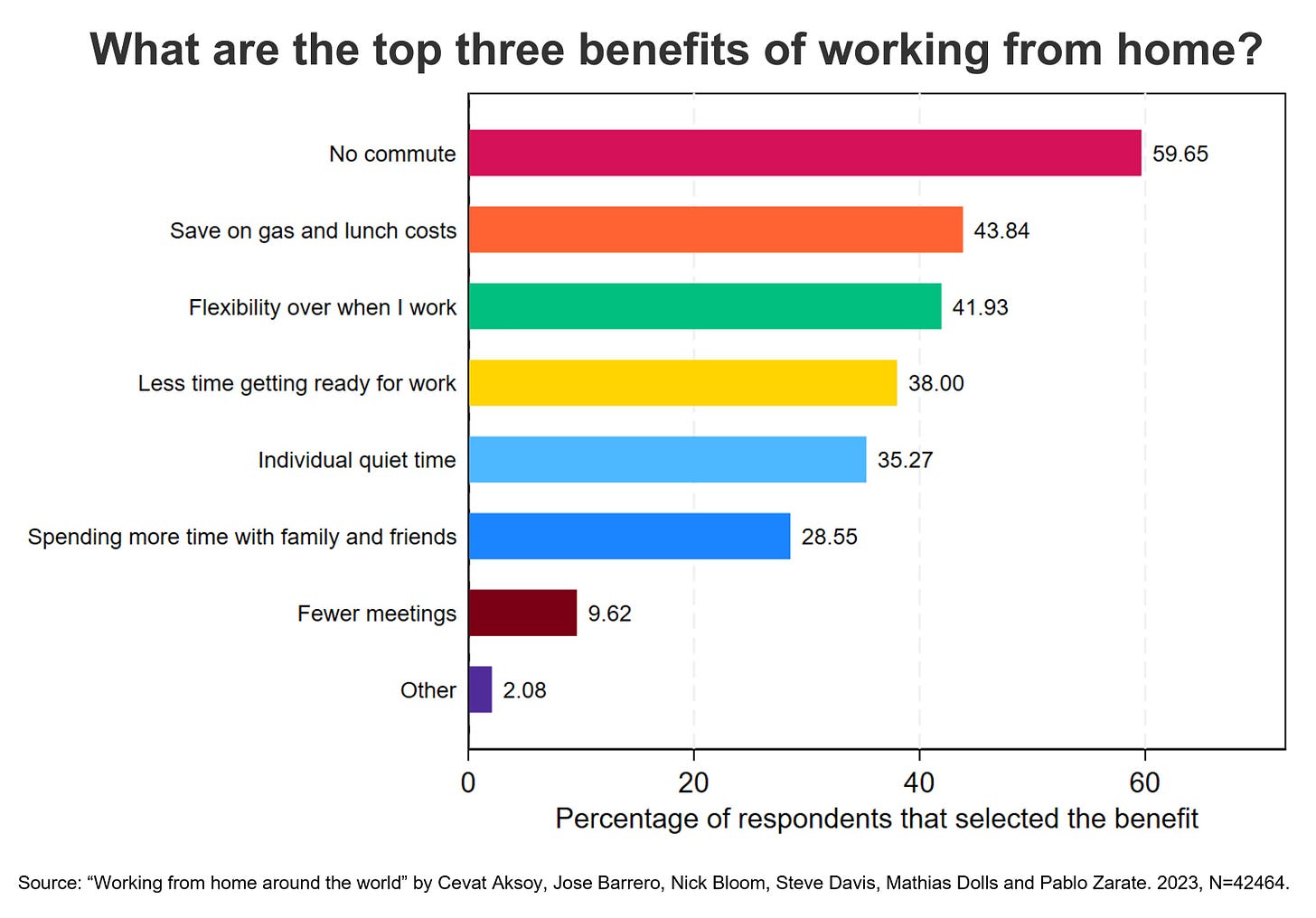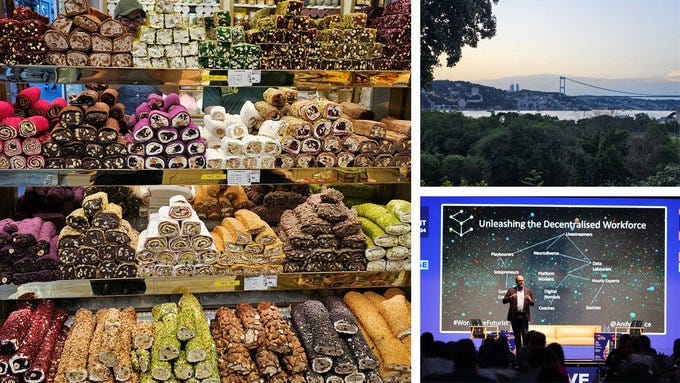- Work3 - The Future of Work
- Posts
- Future of Work Digest #1
Future of Work Digest #1
From Amazon's Office Return to UBI Experiments and More Sustainable Work Practices

Welcome to this edition!
This week, we ask:
As Amazon employees return to the office, does this mark the end for WfH? With the latest study on the benefits of Hybrid working.
Is Universal Basic Income a good idea?
How can we make work more sustainable?
Plus we are delighted to share an Exclusive offer to Subscribers – free lifetime access to Global Leaders Summit digital library of presentations!
Let’s dive in 👇🏻
Eyes on Amazon as staff work from home days are now 'Out Of Stock'

Photo Source - Getty Images
We’ve decided that we’re going to return to being in the office the way we were before the onset of Covid. This will help staff be better set up to invent, collaborate, and be connected enough to each other. CEO Amazon
Amazon is ordering staff back to the office five days a week as it ends its hybrid work policy. With over 1.5 million employees, strengthening culture, teams and refining organisational performance must be a challenge for its leadership.
The change at Amazon is positioned in the context of reducing the number of managers to decrease bureaucracy. They want to operate like the world’s largest startup when they are the world’s 2nd largest employer.
Hey team, you can read the full memo from Amazon CEO to staff here.
While it looks like the days of Hybrid working are past their Prime - a new study reveals some of the benefits.
Benefits of Hybrid Working – Results of a New Study

The top 3 benefits of working from home according to research from Professor Nick Bloom are no more commuting, savings costs, and more flexibility. (you can read his latest report ‘The Future of WFH’ - 32 page PDF presentation )
The results of a new study have been published in Nature and its the first randomised controlled trial of the benefits of hybrid working.
More than 1,600 graduate employees of Trip.com were randomly assigned to one of two groups for a six-month period, with members of one group working five days a week in an office, and those of the other working three days a week in the office and two at home.
The authors found that the hybrid workers generally had:
increased job satisfaction
reduced resignation rates
were as productive as those who worked entirely in-person, as measured by performance reviews.
reduced attrition rates were not seen for managers, who made up one-quarter of the trial sample
Randomised controlled trials are a gold standard for determining the answers to these types of questions. But for work designers, be careful with extrapolating the findings too widely as not every company resembles Trip.com – a multinational headquartered in Singapore with 45,000 employees.
CHRO TIP - an important mantra in these swirling times is DYOR – Do Your Own Research. Evaluate what works best for your workforce and context by using workforce data and running experiments. Adopting an Evidence-Based Management approach can be helpful for example, randomised controlled trials are a better source of evidence than anecdotal evidence from your rivals. When you have to propose your recommendations to the Board, this approach can help avoid the worse mistakes and help you sleep better at night.
For a deeper look, you can read the full Nature article here.
Also one of the real reasons why employers are calling workers back to the office might surprise you - read our Peak Office article to find out more.
Amazon pays salaries to 1.5 million people providing some financial security, but what about those who do not have reliable income?
Is Universal Basic Income A Good Idea?
We frequently discuss the potential impact of AI on Jobs. Some jobs will be lost for sure (see for example, Tech Layoffs in 2024) but one area of job growth is an army of management consultants implementing ‘Gen AI’ for organisations. Accenture reported $3 billion fees for Gen AI last year and plans to increase its data and AI team to 80,000 consultant by the end of 2026.
The business model for Big Consultancies is consistent and simple – generate demand for new technology as it evolves. We have seen this for Cloud computing, mobile, Big Data and now Gen AI. With all new technology we need to critically assess the marketing claims and hype.
Big Tech and associated industries on the bullish side of the argument will tell us that AI will rip out human work over the coming years. In this scenario, income will dry up from traditional employment which generates some tricky question:
How will people feed their families ?
The conversation around Universal Basic Income (UBI) gains momentum. The idea is that the state provides every individual with the minimum income required to live. It is not a new idea, Thomas Paine, proposed something similar in the 18th Century.
Since then there have always been voices from diverse ends of the political spectrum:
From the left – ‘everybody should have enough to live on’
From the right – ‘we should reduce government welfare bureaucracy’
What happens when AI inevitable takes our jobs has prompted Tech companies to fund a new study. This might be motivated by survivors’ guilt, or to answer another question, How can we avoid Universal Basic Unrest?
Sam Altman, CEO of OpenAI, which makes ChatGPT, has launched UBI experiments through his initiative, GiveDirectly,

5,000 participants across two U.S. states receive $1,000 per month for three years.
The researchers highlighted some findings, such as participants:
used the funds to buy essentials like food, rent and transportation, not vices.
cut down on taking un-prescribed painkillers and drinking too much.
had 26% more hospital visits than the control group.
There have been plenty of other UBI studies and they raise lots of questions.
For example Finland’s 2017–2018 UBI trial involved 2,000 unemployed citizens receiving €560 monthly. Results showed improved mental well-being, but no significant impact on employment rates.
Kenya’s ongoing UBI trial, run by GiveDirectly, involves over 20,000 people. It’s one of the largest studies, yet its outcomes in a developing economy might not translate to wealthier nations.
My main issue with these trials, is the experimental hypothesis,
How can we assess whether UBI is a good idea, unless it is actually Universal?
Otherwise these are localised studies, with small samples where the participants live in an economy where others do not have the same safety blanket.
Read more on the UBI study, here.
What do you think - give your views in our POLL on UBI
The behaviours of 3.4 billion people in the Global Workforce make a huge impact on the Earths’ Carbon Footprint – so how can we make work more sustainable?
How Can We Make Work More Sustainable?

Some Turkish Delights in Istanbul
Last week I was honoured to deliver a keynote speech in Istanbul at the Global Leaders Summit. The theme was AI and Sustainability and my talk was “Building a More Equitable and Sustainable Future of Work – Myths and Megatrends”.
John Elkington, known for the Triple Bottom Line concept (Profit, People, Planet), framed the event by outlining some of the critical sustainability challenges of our times. From Natural resources shortages to misinformation, involuntary migration and societal polarisation amongst others.
I emphasised that while humans have caused many of the sustainability problems we face, we must also be the ones to solve them. This will come from diverse teams working creatively. By improving how we work, we significantly increase our chances of addressing these complex challenges.
You can read a bit more about my talk here.
And for those interested in watching some interesting speeches from the event, we have an exclusive offer…
Exclusive offer for Subscribers!
I’m pleased to share with you a complimentary invitation link to register for the Global Leaders Summit 2024 online sessions. This exclusive also provides lifetime access to the digital library of presentations.
We hope that you enjoy this weeks edition of the newsletter, please let us know what you think by commenting or hitting reply to us what you really think! And sharing this article with your network who are interested in building a better future of work helps us extend our offerings over the coming months.
Full of Turkish Delight,
Andy